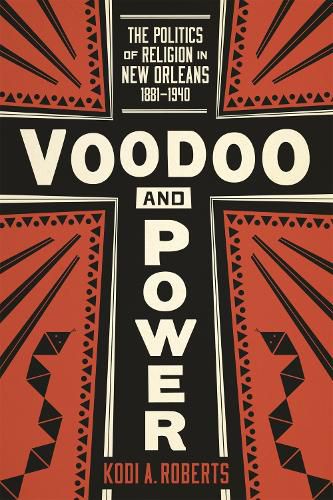Readings Newsletter
Become a Readings Member to make your shopping experience even easier.
Sign in or sign up for free!
You’re not far away from qualifying for FREE standard shipping within Australia
You’ve qualified for FREE standard shipping within Australia
The cart is loading…






The racialized and exoticized cult of Voodoo occupies a central place in the popular image of the Crescent City. But as Kodi A. Roberts argues in Voodoo and Power, the religion was not a monolithic tradition handed down from African ancestors to their American-born descendants. Instead, a much more complicated patchwork of influences created New Orleans Voodoo, allowing it to move across boundaries of race, class, and gender. By employing late nineteenth and early twentieth-century first-hand accounts of Voodoo practitioners and their rituals, Roberts provides a nuanced understanding of who practiced Voodoo and why.
Voodoo in New Orleans, a melange of religion, entrepreneurship, and business networks, stretched across the color line in intriguing ways. Roberts’s analysis demonstrates that what united professional practitioners, or
workers,
with those who sought their services was not a racially uniform folk culture, but rather the power and influence that Voodoo promised. Recognizing that social immobility proved a common barrier for their patrons, workers claimed that their rituals could overcome racial and gendered disadvantages and create new opportunities for their clients.
Voodoo rituals and institutions also drew inspiration from the surrounding milieu, including the privations of the Great Depression, the city’s complex racial history, and the free-market economy. Money, employment, and business became central concerns for the religion’s practitioners: to validate their work, some began operating from recently organized
Spiritual Churches,
entities that were tax exempt and thus legitimate in the eyes of the state of Louisiana. Practitioners even leveraged local figures like the mythohistoric Marie Laveau for spiritual purposes and entrepreneurial gain. All the while, they contributed to the cultural legacy that fueled New Orleans’s tourist industry and drew visitors and their money to the Crescent City.
$9.00 standard shipping within Australia
FREE standard shipping within Australia for orders over $100.00
Express & International shipping calculated at checkout
The racialized and exoticized cult of Voodoo occupies a central place in the popular image of the Crescent City. But as Kodi A. Roberts argues in Voodoo and Power, the religion was not a monolithic tradition handed down from African ancestors to their American-born descendants. Instead, a much more complicated patchwork of influences created New Orleans Voodoo, allowing it to move across boundaries of race, class, and gender. By employing late nineteenth and early twentieth-century first-hand accounts of Voodoo practitioners and their rituals, Roberts provides a nuanced understanding of who practiced Voodoo and why.
Voodoo in New Orleans, a melange of religion, entrepreneurship, and business networks, stretched across the color line in intriguing ways. Roberts’s analysis demonstrates that what united professional practitioners, or
workers,
with those who sought their services was not a racially uniform folk culture, but rather the power and influence that Voodoo promised. Recognizing that social immobility proved a common barrier for their patrons, workers claimed that their rituals could overcome racial and gendered disadvantages and create new opportunities for their clients.
Voodoo rituals and institutions also drew inspiration from the surrounding milieu, including the privations of the Great Depression, the city’s complex racial history, and the free-market economy. Money, employment, and business became central concerns for the religion’s practitioners: to validate their work, some began operating from recently organized
Spiritual Churches,
entities that were tax exempt and thus legitimate in the eyes of the state of Louisiana. Practitioners even leveraged local figures like the mythohistoric Marie Laveau for spiritual purposes and entrepreneurial gain. All the while, they contributed to the cultural legacy that fueled New Orleans’s tourist industry and drew visitors and their money to the Crescent City.